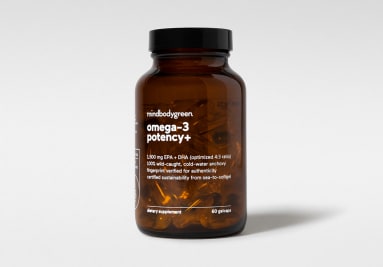Advertisement
This ad is displayed using third party content and we do not control its accessibility features.
According to new research, the answer is “yes.” Specifically, scientists have found that increasing your omega-3 fatty acid intake can help with learning, memory, and abstract thinking.
In a recent cross-sectional Neurology study, researchers found that higher omega-3 levels were associated with larger hippocampal volumes and better abstract reasoning abilities in healthy, middle-aged adults from the Framingham Heart Study cohorts.
How omega-3s promote cognitive health.
It’s no secret that omega-3 fatty acids support brain health and longevity. Whether your mom served salmon the night before you had a big test or you’ve read the science supporting fish oil supplements’ many, many cognitive benefits, omega-3s’ important roles in promoting cerebral blood flow, enhancing working memory, and delivering general neuroprotection have been well-documented.*
Increasing hippocampal volume and bolstering abstract reasoning, however? Well, these benefits are relatively new on the list of the fatty acids’ list of achievements.
Advertisement
This ad is displayed using third party content and we do not control its accessibility features.
Memory & learning
A prominent (and complex) part of the temporal lobe, the hippocampus is vitally important for learning and memory. A smaller hippocampus is associated with long-term cognitive health challenges, while larger volume is associated with healthy memory, neuroplasticity, and more.
The Neurology study found that higher overall omega-3 index levels (i.e., a blood test and status biomarker of the amount of EPA and DHA in your red blood cell membranes) were associated with larger hippocampal volume. This is especially interesting considering the average age of participants in the study (46 years old) because hippocampal volume begins to decrease around middle age. Finding ways to maintain healthy volume (like increasing omega-3 intake) can help support cognitive function later in life.
Abstract reasoning
The Neurology study also found that higher omega-3 index levels were associated with better abstract reasoning.
Abstract reasoning, aka abstract thinking, is the ability to understand and think about abstract concepts and ideas (e.g., humor, love, success, freedom, and wisdom). Since these concepts aren’t tied to concrete people, places, or things, they require a level of creative thinking to fully grasp.
This kind of “out of the box” thinking is also related to fluid intelligence, or the ability to solve problems in a unique way. If you’ve ever been faced with a problem that couldn’t be resolved with logic or concrete thinking, you realize how important the ability to think abstractly to come up with a creative solution truly is.
Advertisement
This ad is displayed using third party content and we do not control its accessibility features.
The takeaway.
Whether you’re trying to solve an abstract problem creatively or support your hippocampal health, upping your omega-3 intake is a beneficial way to promote cognitive function and longevity.
For an easy way to do just that, consider a premium omega-3 supplement that’s rich in omega-3s, like mindbodygreen’s omega-3 potency+. With 1.5 grams of EPA plus DHA, this sustainably sourced fish oil supplement delivers the healthy fats your brain needs to think abstractly and function optimally—today and down the road.*
If you are pregnant, breastfeeding, or taking medications, consult with your doctor before starting a supplement routine. It is always optimal to consult with a health care provider when considering what supplements are right for you.



